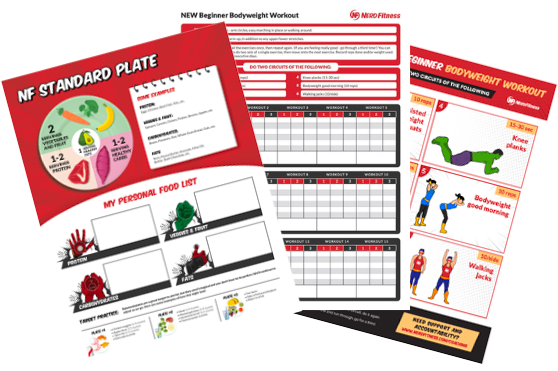
Let’s learn how to jump rope!
Today we’ll help you get started, even if you’ve never touched a jump rope before (in fact, we’ll show you how to get going without one).
We specialize in helping beginners learn how to train, so you’re in the right place if you’re a little nervous about tangling yourself up.
Here’s what we’ll cover:
- How do I jump rope? (Video for Newbies)
- The Nerd Fitness Jump Rope Workout (with Video Tutorial)
- The 13 best jump rope exercises
- How do I choose a jump rope? (Length and Type)
- Jumping “rope” without a rope (Jump Rope Alternatives)
- Where should I jump rope?
- Will a jump rope help me lose weight?
- How do I build a jump rope workout (next steps)
Cue the Rocky theme song…
How Do I Jump Rope? (Video for Noobs)
Coach Matt, from our Online Coaching program, guides you through learning how to jump rope in the video above.
Matt breaks down jumping rope into three parts:
- The Jump
- The Arm Swing
- Timing
First up…
#1) The Jump
First, let’s just practice jumping.
Stand tall, feet about hip-width apart.
Then, practice jumping up and down in one spot.
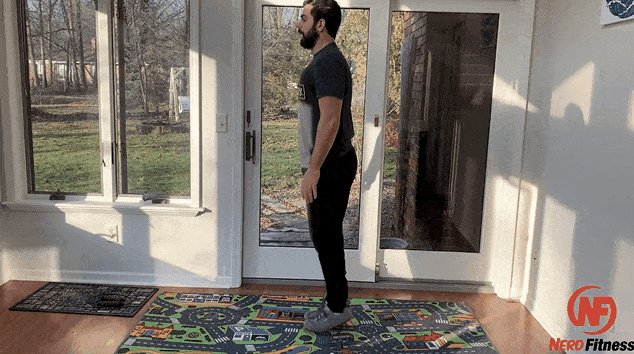
Most of your power will come from your ankle and toes. It’s really more of a “hop” than jump.
If you have trouble with this, Coach Matt recommends drawing some type of “X” or mark on the ground so you stay in one place.
Another tip from Coach Matt: keep a little tension throughout your body. If you’re too loose, you might flail around a bit and get off your mark.
#2) The Arm Swing
Your arms will remain mostly stable when powering the rope. We want to keep the movement narrow, mostly coming from your wrists.
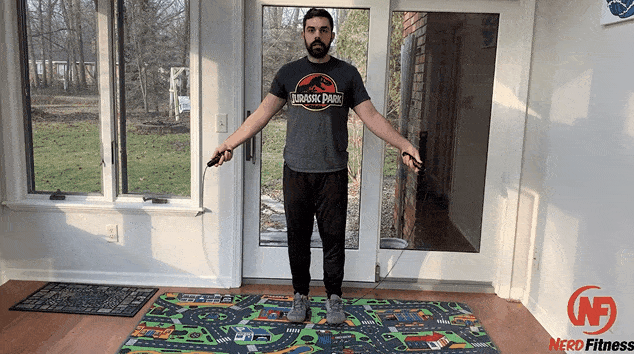
The name of the game with jumping rope is “in control.” Swinging from the wrists will help you maintain control of the rope.
Resist trying to rotate with a lot of elbow movement (try to keep them stable instead).
For the position of your arms, you want your hands out roughly at the height of your hips. Your arms will go downward at about a 45-degree angle.
To start, you might even just try getting the rhythm down with one hand:
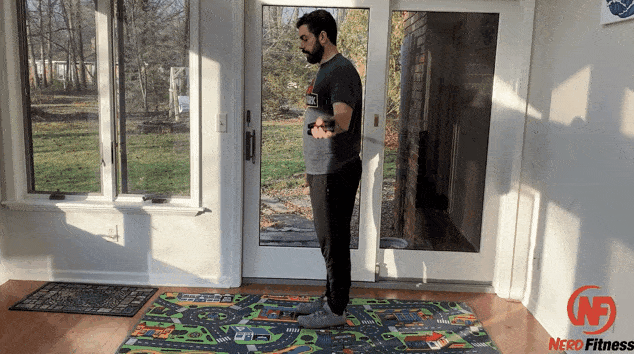
Don’t even worry about jumping at first.
Once you’re comfortable swinging from both hands, it’s time to think about putting it all together.
#3) Timing
When you first get going, go slow with the arms, and do two hops per one rope revolution.
It looks like this:
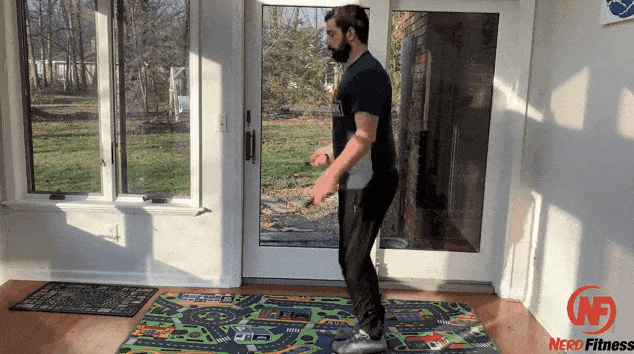
When starting with this position, you might find your elbows flailing out a bit since they’re moving slow. So you’ll have less wrist control.
That’s okay.
Once you get comfortable with the rhythm, try one hope per rope revolution to tighten it all up. You may find it easier to keep your arms and elbows stable moving faster.
Here’s a great point from Coach Matt: as a beginner, the rope itself will be your coach.
If you hit your shins or toes with the rope, something went wrong. Maybe you hopped too high or your elbows went a little off.
No problem. Just accept that the rope is providing you with immediate feedback, and try again.
Getting the rhythm and timing down with a jump rope can be tricky, so hang in there and be patient.
Once you get the feel of it, it’s time to do some workouts.
The Nerd Fitness Jump Rope Workout (With Video Tutorial)
Coach Matt walks you through 5 different levels of difficulty for your jump rope workout.
If you’re familiar with High-Intensity Interval Training, you’ll notice it’s the strategy for our beginner jump rope workouts.
Let’s go over each level now.
Jump Rope Workout Level 1:
- Single Unders: 30 Seconds
- Rest: 30 Seconds
- Single Unders: 30 Seconds
- Rest: 30 Seconds
- Single Unders: 30 Seconds
- Rest: 30 Seconds
- Single Unders: 30 Seconds
- Rest: 30 Seconds
- Single Unders: 30 Seconds
- Rest: 30 Seconds
Total time: 5 minutes
If this is too much, feel free to increase your rest period. Meaning you can rest for 45 seconds, no problem.
For the next level, we’ll do the same moves, but we’ll increase your single under duration
Jump Rope Workout Level 2:
- Single Unders: 45 Seconds
- Rest: 15 Seconds
- Single Unders: 45 Seconds
- Rest: 15 Seconds
- Single Unders: 45 Seconds
- Rest: 15 Seconds
- Single Unders: 45 Seconds
- Rest: 15 Seconds
- Single Unders: 45 Seconds
- Rest: 15 Seconds
Total time: 5 minutes
On Level 3, it’s time to mix in double unders.
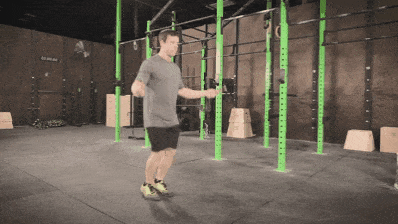
During our jump interval, you can do every other, so one single under followed by one single double under (1 jump, 2 rotations of the rope).
If this is too tricky, do a double under for every four normal jumps.
Just try to keep it consistent, as this will help your rhythm.
The mission with Level 3 is to get comfortable performing double unders.
Jump Rope Workout Level 3:
- Single/Double Under Mix: 30 Seconds
- Rest: 30 Seconds
- Single/Double Under Mix: 30 Seconds
- Rest: 30 Seconds
- Single/Double Under Mix: 30 Seconds
- Rest: 30 Seconds
- Single/Double Under Mix: 30 Seconds
- Rest: 30 Seconds
- Single/Double Under Mix: 30 Seconds
- Rest: 30 Seconds
Total time: 5 minutes
Now that you’re at Level 4, it’s all double unders, all the time.
We’re going to focus on building power, so we’ll do intervals for 15 seconds, then rest for 45.
Jump Rope Workout Level 4:
- Double Unders: 15 Seconds
- Rest: 45 Seconds
- Double Unders: 15 Seconds
- Rest: 45 Seconds
- Double Unders: 15 Seconds
- Rest: 45 Seconds
- Double Unders: 15 Seconds
- Rest: 45 Seconds
- Double Unders: 15 Seconds
- Rest: 45 Seconds
Total time: 5 minutes
With our last workout today, we’re bumping up the duration of double unders to 30 seconds, then resting for the same time.
This might be challenging.
Jump Rope Workout Level 5:
- Double Unders: 30 Seconds
- Rest: 30 Seconds
- Double Unders: 30 Seconds
- Rest: 30 Seconds
- Double Unders: 30 Seconds
- Rest: 30 Seconds
- Double Unders: 30 Seconds
- Rest: 30 Seconds
- Double Unders: 30 Seconds
- Rest: 30 Seconds
Total time: 5 minutes
If single and double jumps get boring, have no fear.
We’ll cover additional exercises you can do to level up your jump rope game now.
Feel free to mix and match any of the moves below into your workout.
After a while, your rest period might be normal hops, while your interval period can be one of these sweet moves.
The 13 Best Jump Rope Exercises

Now that you have the basics down on how to jump rope, let’s cover some moves so you can expand your workouts.
#1) The Single Under

This is the most basic jump rope exercise. One hop per rope revolution, both feet together.
Get this down before you move on from here.
#2) Double Single Foot Jumps
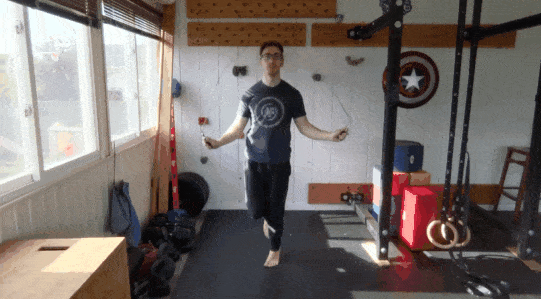
Once you get the single under down, try hopping on one foot.
To really test your balance, jump twice from the same foot.
An example beat would go left foot, left foot, right foot, right foot, with one rope revolution between.
#3) Kick Out Jumps
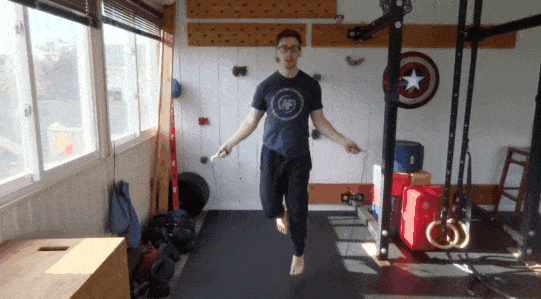
Here, you’ll alternate taking one foot forward every jump.
So while your left is down, your right foot will be kicking out.
You’ll hop and switch feet between rope revolutions. This is trickier than it looks.
#4) Jump Rope Jacks
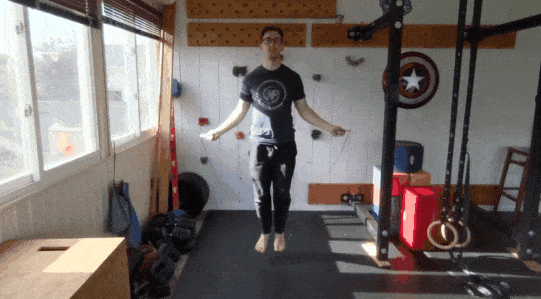
Your feet will act as they would in a normal jumping jack, jumping wide apart every other hop.
Your arms will stay as they would during a normal single under, so it’s more of a “half jack.”
#5) Twist Jumps
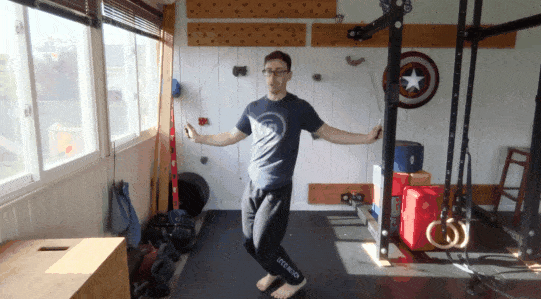
This jump rope exercise is all about rotating your torso.
Your feet will jump together, but will be rotating about 180 degrees from left to right, twisting from your hip.
Your shoulders will stay firm, which will keep the rope in place.
#6) Skiers
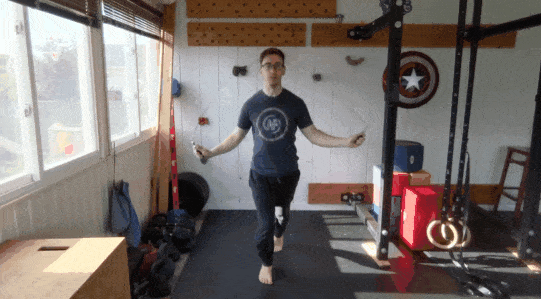
The feet will land together for your skiers, but one leg will be in front and the other will be behind.
You’ll alternate leg positions between jumps, in a scissor-like motion.
#7) High Knees
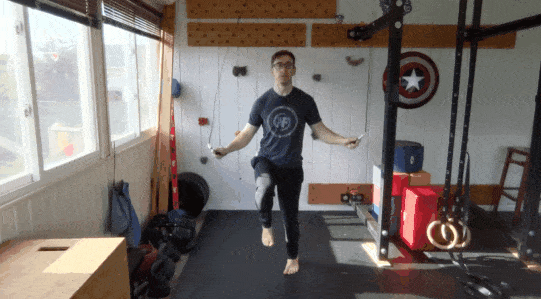
Alternate jumping from one leg to the other with your hops. The trick here is to bring your knees up high as you do so.
#8) Butt Kicks
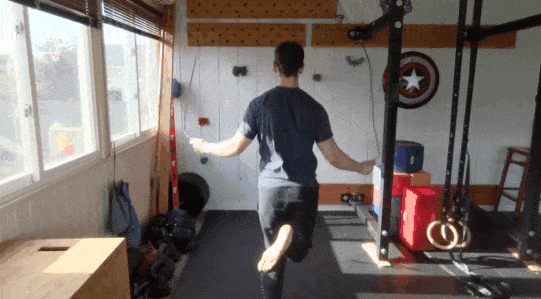
These are much like your high knees, but in reverse, as you’re trying to bring your foot back to the point where it meets your glute (butt).
A good counter exercise for your high knees.
#9) Squat Jumps
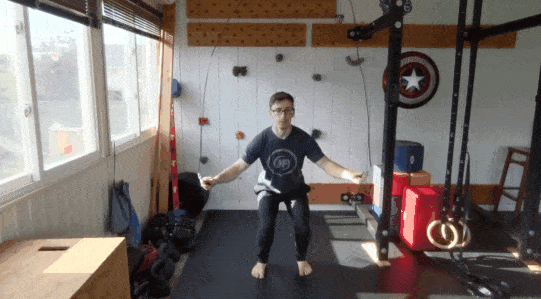
If you want to really challenge your lower body, hold a squat position while doing your hops.
Your entire lower body will be engaged for this exercise.
#10) Squat Jacks
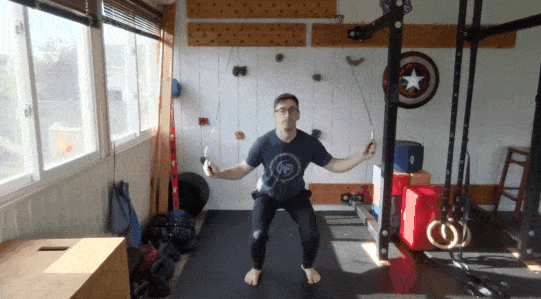
Just like the name would suggest, here we are combining our squat jumps with jumping jacks.
To do it, perform jump rope jacks, but land in a squat position when your legs are kicked out wide.
This will get challenging quickly.
#11) Criss Cross Jacks
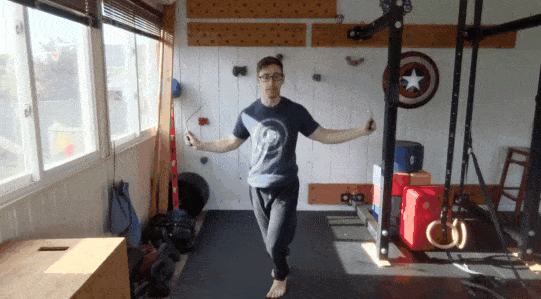
These are like jumping jacks, but instead of bringing your feet together, you cross one foot in front of the other.
Your feet will go wide, then left in front of right, then wide, then right in front of left, then wide.
After some practice, you’ll get the coordination down.
#12) Jump Rope Figure 8
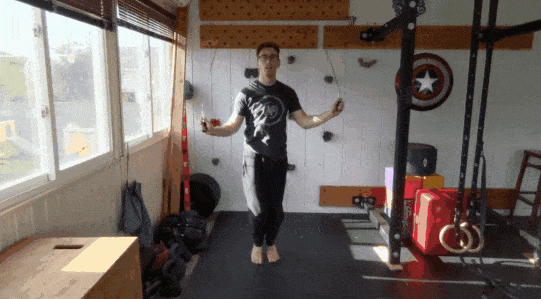
We’re gonna have fun with this one.
This exercise has you doing four normal hops, followed by four twist jumps.
Here’s the fun part: when you rotate, bring your arms together and have the rope do a revolution on the side you’re twisting away from. Alternate to the other side, combining your twist, hop, and whip.
Don’t feel bad if this takes some practice. This is starting to get into the “jump rope tricks” territory.
#13) The Double Under
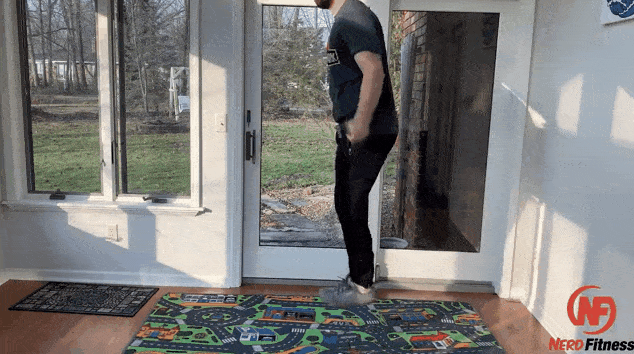
This is one of the more advanced jump rope moves, as you need to swing the rope under you twice per hop.
Here’s a video on how to perform double unders:
If you get the double under down consistently, you’re no longer a jump rope noob.
Want a workout that will have you doing some of these jump rope moves? If so, check out our new app!
NF Journey will match a workout for you based on your experience level, and will also show you exactly how to use your jump rope.
No guesswork needed, just grab your rope and follow along with the app.
You can sign-up for a free trial right here:
How Do I Choose a Jump Rope? (Type and Length)


There are a couple of things to consider when choosing a jump rope: type and length.
Let’s discuss both.
There are generally three types of jump ropes you’ll run into.
#1) Speed Ropes
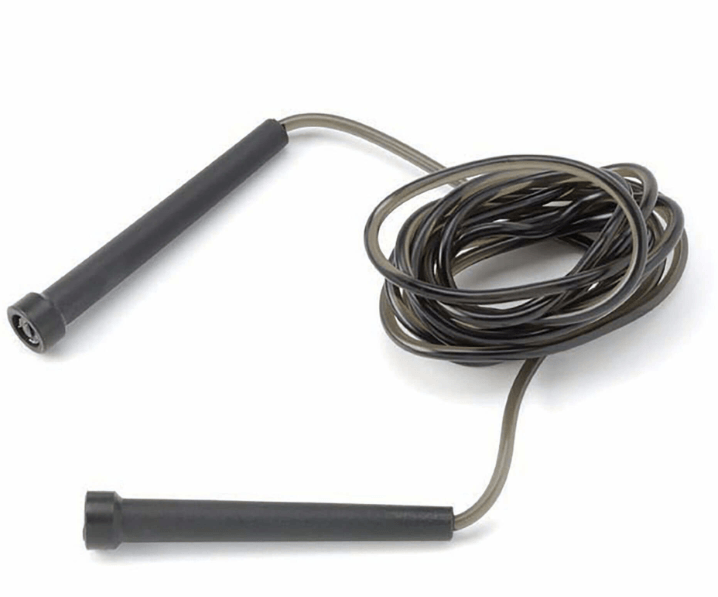

This is the most common type of jump rope you’ll come across. It’s also what Coach Matt uses in his videos above.
Speed ropes are lightweight, which will help when doing certain moves like the double under.
Coach Matt’s speed rope has a plastic covering, but occasionally you’ll find these with just the wire. This makes them even lighter. The danger here is that if you hit yourself…it’s with a bare wire…
Ouch.
WOD Nation has a decent coated speed jump rope that you can find.
#2) Beaded Ropes
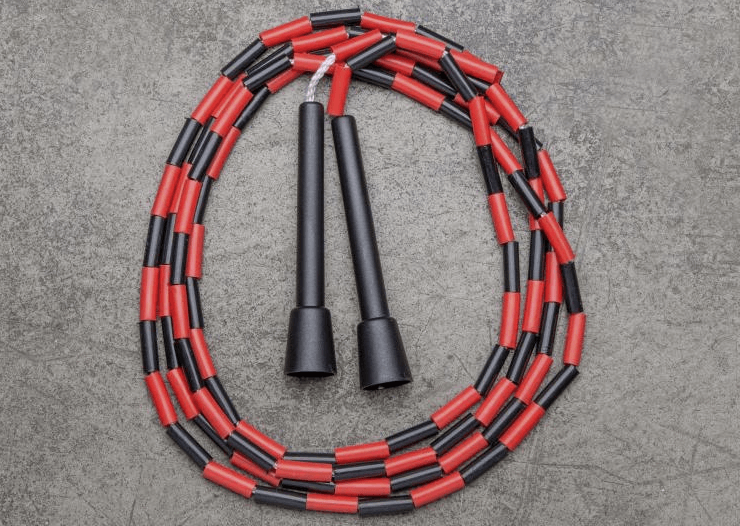

This rope is probably what you used as a kid on the playground.
Beaded jump ropes don’t tangle as easily as speed ropes and weigh a bit more.
They are also clunkier and will make double unders tougher, but the little bit of extra weight might make them easier for a beginner to handle.
Rogue Fitness has some pretty cool ones to check out.
#3) Weighted Ropes
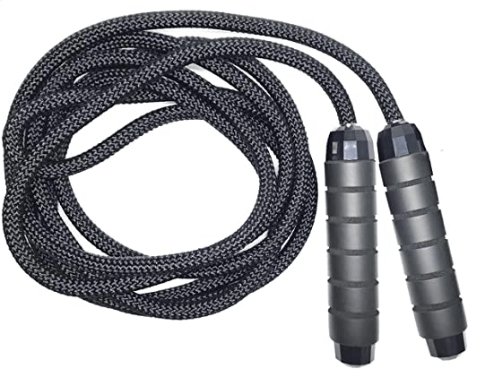

For more advanced jumpers, we have weighted ropes.
These can range from a one-pound rope to a six-pound rope.
Why the additional weight?
With extra weight added, your upper body gets a more intense workout.
If you’re a beginner, it’s probably best to skip these for now (hehe), but something to consider as you level up your jump rope skills.
For those interested, this is a decent weighted jump rope to buy.
The next question we want to answer: how long should my jump rope be?
The good news here: most jump ropes you purchase will be adjustable.
When properly adjusted, step on your jump rope with one foot, and both handles should reach right around your armpit:
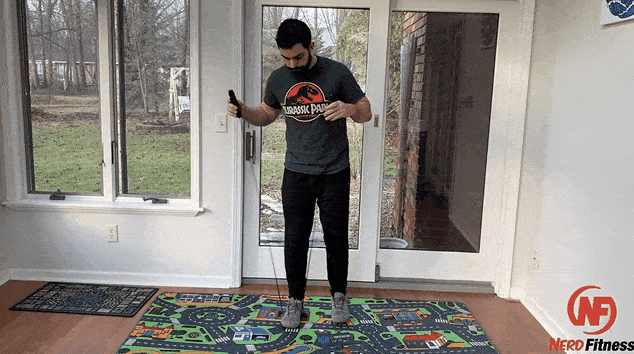

If it’s a little higher or lower than that, you may be okay, but you’ll likely need good jump rope technique to skip correctly.
How to Jump Rope (Without a Rope)
In the video above, Coach Jim walks you through 3 alternatives to jumping rope.
Just in case you want to get your heart rate up and you don’t have a rope around, or if you’re just getting started and haven’t quite got your rhythm dialed in.
Here are three alternatives for jumping rope:
Jump Rope Alternative #1: Marching in Place
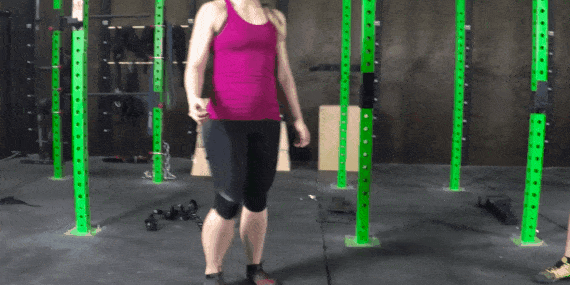

This is as easy as it sounds, simply march in place. The higher you bring your knees, the more challenging this will become.
Jump Rope Alternative #2: Mountain Climbers
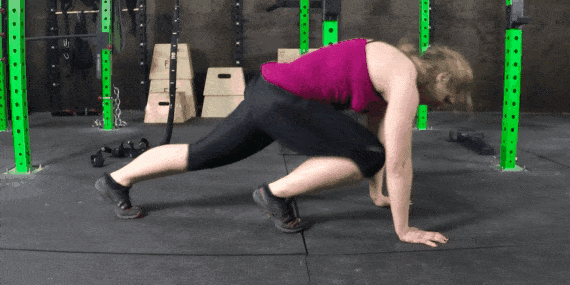

To do a mountain climber:
- Place your hands and knees on the floor.
- Place your right foot near your right hand, but extend your left leg behind you.
- In one motion, switch your legs, keeping your arms in the same position.
- Continue to switch your legs, attempting to keep your arms and back in a staple position.
Jump Rope Alternative #3: Hop in Place
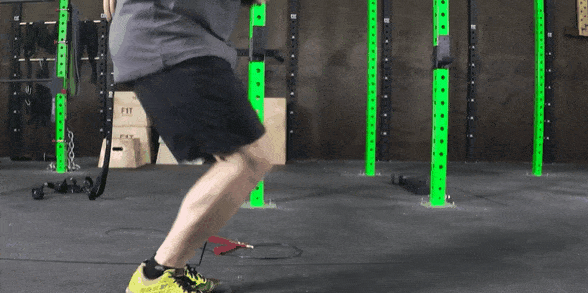

And last but not least, you can simply hop in place for a jump rope alternative.
Where Should I Jump Rope?
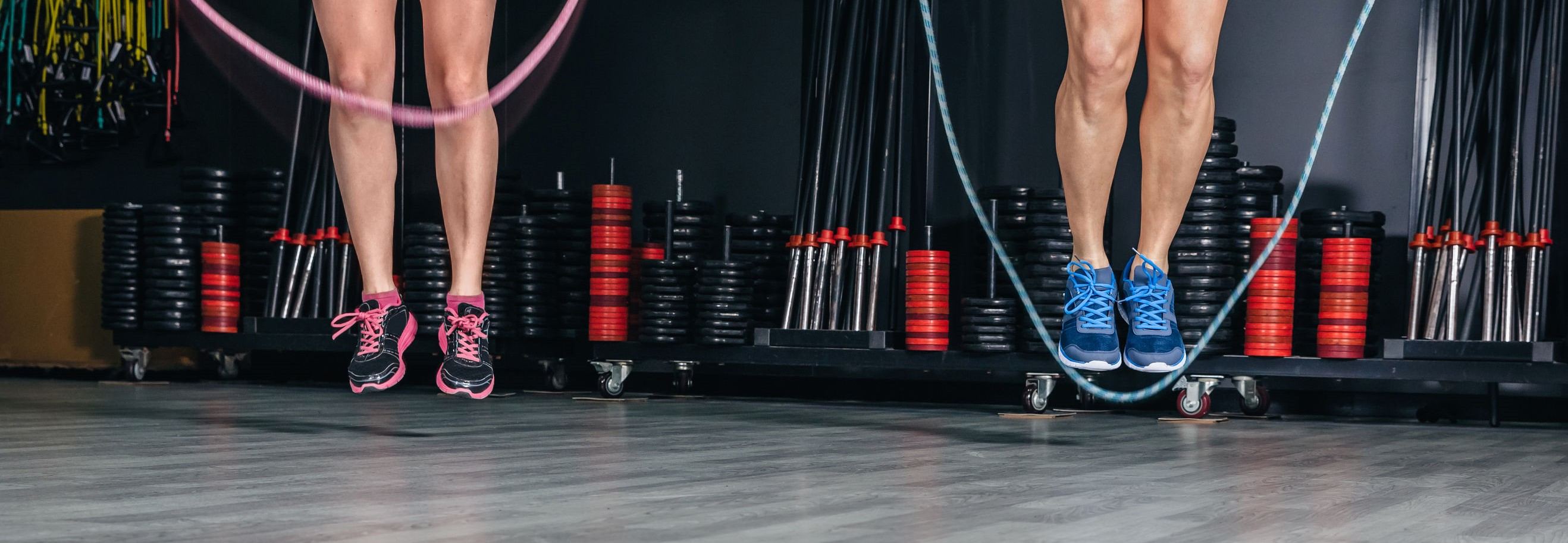

The cool thing about a jump rope is that you can pretty much use it anywhere, as long as you have room to maneuver.
That doesn’t really mean you SHOULD jump wherever, as not all surfaces are created equal for jumping.
In the videos and gifs above, you’ll notice that both Nerd Fitness Coaches use mats for their jump rope practice.
This is a good idea.


Jumping on a mat will put less stress on your joints, lowering your chance of injury.
If you do jump on a harder surface like concrete or asphalt, it’s okay, just focus on less intense moves like single unders. You might want to save the fancy moves and double unders for when you have a more forgiving surface under you.
The other thing to consider is your footwear.
Something with good shock absorption will help as your feet make contact with the ground.
You don’t necessarily need a running shoe, since you’ll be coming up and down from your toes. But you probably don’t want to jump barefoot either, because that rope hitting unprotected toes won’t be fun.
Here’s our guide on healthy feet that includes some general shoe recommendations.
Will Jumping Rope Help Me Lose Weight?


If you’re trying to lose weight, a jump rope and one of the workouts above could be a great part of the plan.
The other part of the plan should be your nutrition!
As we lay out in our Coaching Program, throughout Nerd Fitness Prime, and our massive guide on “Healthy Eating,” we believe that nutrition is 80-90% of the equation for weight loss.
No joke.
It’s by far the biggest factor for success.
So will you lose weight jumping rope?
Definitely maybe!
If you fix your diet AND begin to incorporate a jump rope workout a few times per week, you’ll find yourself building muscle, losing fat, and getting stronger!
That’s because a jump rope will you train your:
- Calves
- Rear Deltoids
- Abdominals
- Quads
- Hamstrings
As long as you do it correctly:


My point is jumping rope needs to be part of a larger picture for weight loss.
So how do you fix your diet?
Great question.
Whether you choose to follow a Keto Diet, Paleo Diet, Mediterranean Diet, or something like Intermittent Fasting, the best path will be up to your goals, your situation, and your habits.
Here are some basic tips though (as we cover in The 5 Rules of Weight Loss):
- If your goal is weight loss, you have to eat less than you burn each day. This can be through eating less and burning more (from the resistance band workout above)
- Processed foods and junk food make it really tough to lose weight: They have lots of calories and carbs, low nutritional value, don’t fill you up, and cause you to overeat.
- Vegetables are your friends. If you don’t like veggies, here’s how to make vegetables taste good.
- Liquid calories are sabotaging your efforts. Soda, juice, sports drinks: they’re all pretty much high-calorie sugar water with minimal nutritional value. Get your caffeine from black coffee or tea, fizzy-drink fix from sparkling water.
- Eat more protein! Protein helps rebuild muscle and can help you stay under your calorie limit because it’s satiating and filling. Here’s exactly how much protein you should be eating every day.
Those tips should get you started, but if you want more specific instruction and guidance, check out the NF Coaching Program – Your Coach will build a routine tailored to your individual needs and what equipment you have available:
How to Build a Jump Rope Workout (Next Steps)


The only question left to answer with this guide is “When should you do your jump rope workouts?”
You have a bunch of different options for that, with a few considerations.
Here are 3 ways to incorporate workouts into your training:
#1) Jumping rope for warm-ups
All Nerd Fitness Workouts have a note to warm up before you start.
It can be five minutes of simple exercises like arm circles:
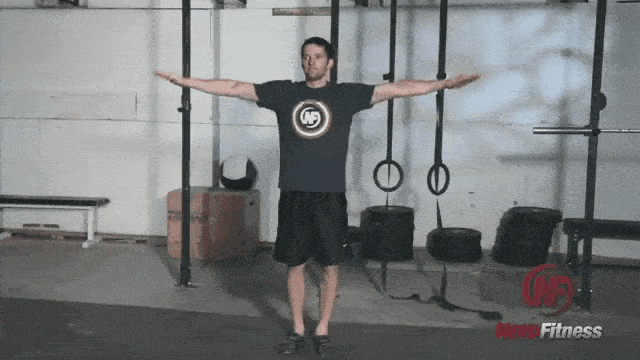

Or jumping jacks.
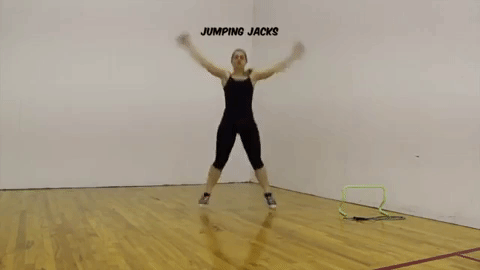

Do you know what else it can be?
Five minutes of jump rope!
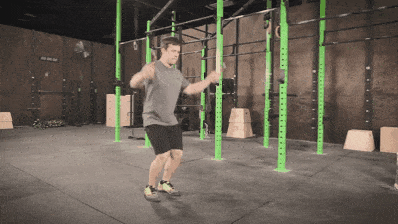

A short round of jump rope is a perfect warm-up for any workout you pick.
Is your gym closed? No problem, check out our guide The 8 Best at Home Workouts.
#2) Jump rope for active recovery
Active recovery is any gentle movement designed to help your muscles heal after training.
If you hop with low intensity, a jump rope workout can fit this bill perfectly.
In between your strength training workouts, you can mix in some jump rope, stretching, or even a little yoga for active recovery.
If you don’t want to jump with low intensity, you have another path.
#3) Jump rope as a full-body workout
With enough intensity, a jump rope can provide a great full-body workout.
You can up the intensity by working up to double unders or other advanced jump rope exercises.
Or you can look into a weighted rope once you get the swing of things.
The other thing to consider would be circuit training, where you mix in jumping rope with some bodyweight exercises.
Maybe you alternate burpees with your jump rope intervals.
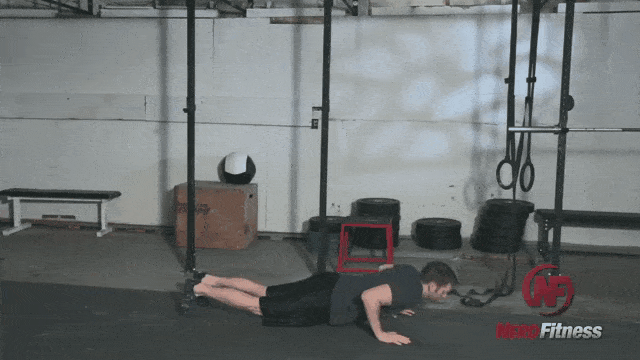

Lots of HIIT workouts include jump rope sessions, so you have tons of ways to bring your jump rope into your training.
Once you get your technique nailed down, the world will become your jump rope playground:


If you need any help pulling this all together, Nerd Fitness is here for you.
We have three great options for continuing your journey with us.
Option #1) If you want a professional coach in your pocket, who can do video form checks, provide feedback, and adjust your workouts based on the equipment you have available, check out our 1-on-1 Online Coaching Program!
For example, let’s say you find yourself stuck indoors during a pandemic, and you want somebody to custom-build you a workout program based on the furniture and equipment you have (like a jump rope). That’s where an online coach is a game-changer!
Personally, I’ve been working with the same online coach since 2015 and it’s changed my life. You can learn more by clicking on the box below:
#2) If you need a trigger to “get up and jump” check out NF Journey. Our fun habit-building app helps you exercise more frequently, eat healthier, and level up your life (literally). Plus, we’ll send you on an adventure that teaches you how to jump rope!
Try your free trial right here:
Option #3) Become part of the Rebellion! We need good people like you in our community, the Nerd Fitness Rebellion.
Sign up in the box below to enlist and get our Rebel Starter Kit, which includes all of our “work out from home” guides.
Alright, I want to hear from you and your experience with jumping rope!
Do you train with jump ropes?
Any exercises or tricks we’re missing?
Are you one of those people who hasn’t touched a jump rope since grade school?
Let me know in the comments!
-Steve
P.S. If you’re looking for more ways to do interval training, check out The 20-Min HIIT Workout for Home.
###
Photo Source: Speed Jump Rope, Beaded Jump Rope, Weighted Jump Rope, 166/366, Boxing a gentleman’s sport, Jump Rope, Laughing Buddha, David Pereiras Villagrá © 123RF.com, 167/366




